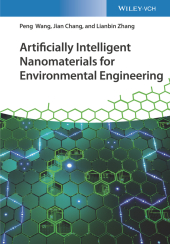 Neuerscheinungen 2019Stand: 2020-02-01 |
Schnellsuche
ISBN/Stichwort/Autor
|
Herderstraße 10
10625 Berlin
Tel.: 030 315 714 16
Fax 030 315 714 14
info@buchspektrum.de |

Jian Chang, Peng Wang, Lianbin Zhang
(Beteiligte)
Artificially Intelligent Nanomaterials
For Environmental Engineering
1. Auflage. 2019. 320 S. 100 SW-Abb., 50 Farbabb. 244 mm
Verlag/Jahr: WILEY-VCH 2019
ISBN: 3-527-34494-2 (3527344942)
Neue ISBN: 978-3-527-34494-9 (9783527344949)
Preis und Lieferzeit: Bitte klicken
Presents novel, nanotechnology-based solutions for urgent environmental engineering problems
Clear and concise from beginning to end, this book focuses on the design and application of artificially intelligent nanomaterials, which help in solving many tangible environmental problems?especially water and air pollution. It lays out the design concepts, major chemical principles, and materials considerations of artificially intelligent nanomaterials for environmental engineering, and provides proof-of-concept examples such as improved filtration membranes, nanofibrous air filters, and molecularly imprinted nanomaterials.
Artificially Intelligent Nanomaterials: For Environmental Engineering starts by describing the background of environmental nanotechnology, the rise of Artificial Intelligence (AI), and the current status of AI in environmental engineering. It then looks at: intelligently functional materials and responsive mechanisms; designing filtration membranes with responsive gates; switchable wettability materials for controllable oil/water separation; and self-healing materials for environmental applications. The book continues with chapters that examine: emerging nanofibrous air filters for PM2.5 removal; self-propelled nanomotors for environmental applications; molecular imprinting in wastewater treatment; and emerging synergistically multifunctional and all-in-one nanomaterials and nanodevices in advanced environmental applications.
-Presents the state-of-the-art in environmental technology and puts forward bold ideas for its advancement
-Addresses global challenges, including all important water and air quality which are critical for human health and a sustainable future
-Concentrates on nanotechnology-enabled solutions for pollutant removal from water and air
Artificially Intelligent Nanomaterials: For Environmental Engineering is an ideal book for undergraduates, graduates, scientists, and professionals in the fields of environmental science, material science, chemistry, and chemistry engineering.
Introduction
Intelligent Nanomotors in Environmental Detection and Remediation
Nanoparticles in Environmental Engineering
Designing Filtration Membranes with Responsive and Intelligent Gates
Responsive and Switchable Wettability Materials for Selective and On-Demand Oil/Water Separation
Self-Healing Materials for Environmental Applications: Including Self-Recovery of Physical Damages, Self-Restoration of Lost Surface Functions and Self-Cleaning of Contaminated Surfaces
Intelligently Designed Nanofibrous Air Filters for PM2.5 Removal
Molecularly Imprinted Nanomaterials for Selective Pollutant Removal
Emerging Synergistically Multifunctional and All-in-One Nanomaterials and Nanodevices in Advanced Environmental Applications
Concluding Remark and Future Perspectives
Peng Wang, PhD, is Associate Professor of Environmental Science and Engineering at the Water Desalination and Reuse Center of the King Abdullah University of Science and Technology (KAUST), Saudi Arabia. Jian Chang, PhD, is currently a research engineer in Professor Peng Wang´s group at KAUST. Lianbin Zhang, PhD, is Full Professor of chemistry at Huazhong University of Science and Technology, China.


